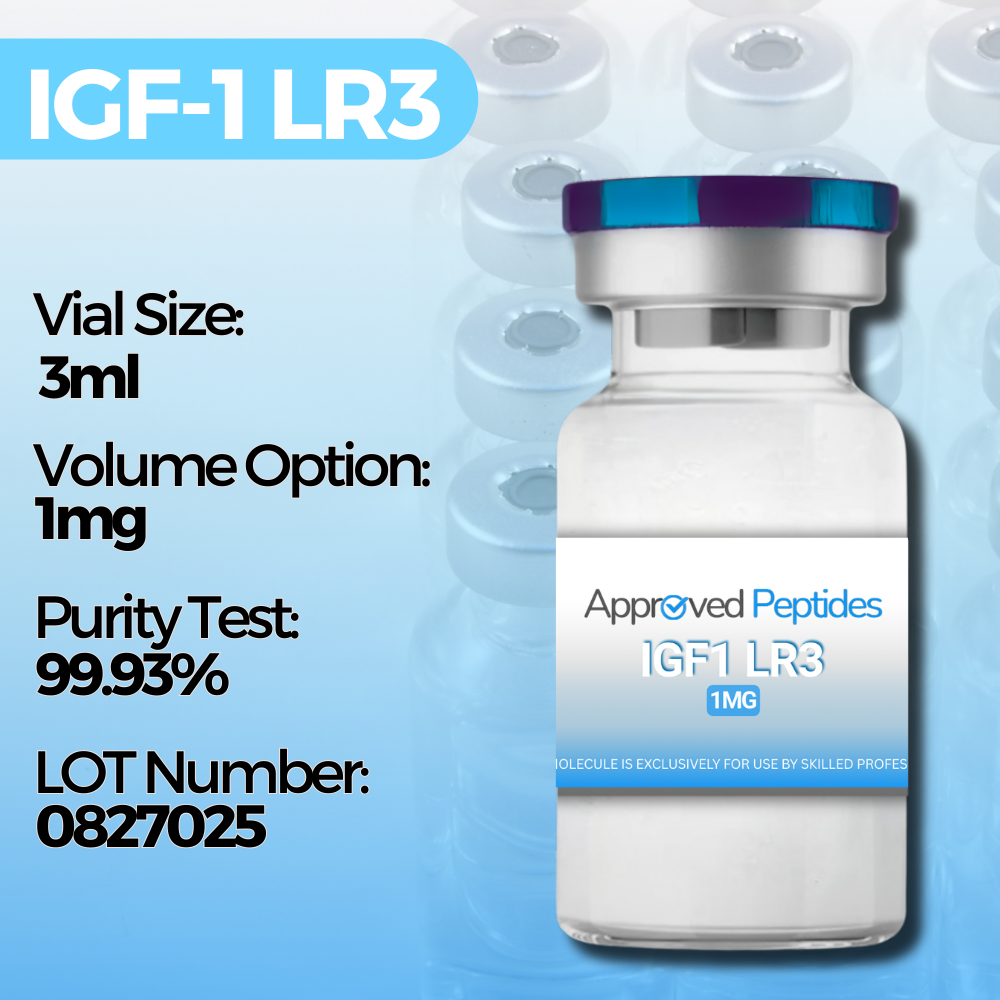Approved Peptides are intended for licensed medical professionals and experienced researchers. Reconstitution required. Dosing and use instructions are not provided.
IGF1 LR3
IGF1 LR3
Couldn't load pickup availability
IGF-1 LR3 (Insulin-Like Growth Factor-1 Long Arg3) – Research Peptide Review
A Potent Analog of IGF-1
IGF-1 LR3 is a synthetic analog of the naturally occurring Insulin-Like Growth Factor-1 (IGF-1), a peptide hormone crucial for growth, repair, and metabolic regulation. By modifying the IGF-1 structure with a substitution at the third amino acid (arginine) and extending the peptide to 83 amino acids, scientists created a form that resists binding to IGF-binding proteins (IGFBPs).
This modification dramatically enhances bioavailability and half-life, allowing IGF-1 LR3 to remain active in circulation for up to 20–30 hours — compared to only 20 minutes for native IGF-1. Because of this stability, IGF-1 LR3 has become an important tool for exploring cellular growth, repair, and metabolic adaptation in laboratory models.
Research Applications and Benefits
IGF-1 LR3 has been widely studied for its anabolic and regenerative properties, with research pointing toward:
-
Muscle Growth and Repair
IGF-1 LR3 stimulates satellite cell activation and muscle fiber hypertrophy, making it a peptide of interest in muscle regeneration studies and recovery models. -
Cell Proliferation and Survival
By binding to IGF-1 receptors and activating the PI3K/Akt pathway, IGF-1 LR3 supports cellular growth, survival, and protein synthesis. -
Neuroprotection
IGF-1 has been shown to support neuronal growth, synaptic plasticity, and protection against neurodegeneration. LR3’s extended half-life makes it especially valuable in long-term neurobiology research. -
Metabolic Regulation
IGF-1 LR3 plays a role in glucose metabolism and insulin sensitivity, making it relevant in metabolic research and models of insulin resistance. -
Tissue Healing
IGF-1 is critical in bone, tendon, and connective tissue repair, and LR3’s stability amplifies these effects in experimental models.
As with all peptides offered for research use only, IGF-1 LR3 is not approved for human use or medical treatment.
- Stability – Typically provided in lyophilized form, IGF-1 LR3 should be stored in a cool, dry environment until reconstitution.
- Potency – Due to its enhanced half-life and reduced binding to IGFBPs, IGF-1 LR3 is more potent than native IGF-1, and should be handled carefully in controlled research settings.
- Regulatory Status – IGF-1 LR3 is not FDA-approved and remains investigational worldwide. It must not be promoted or sold as a supplement, therapy, or medication.
IGF-1 LR3 is one of the most powerful anabolic research peptides available, extending the natural activity of IGF-1 to provide enhanced insight into cell growth, muscle repair, metabolic regulation, and neuroprotection.
For researchers committed to advancing the study of regenerative biology and performance science, IGF-1 LR3 offers a unique and potent tool for understanding the mechanisms of growth and recovery at the cellular level.
Share


